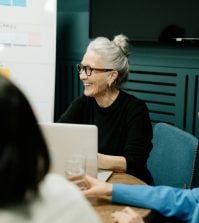‘The best leaders focus on inspiring and enabling their staff to give their best’: five minutes with… Ireland’s CIO Barry Lowry

Lowry, who was director of ICT shared services and strategy for the Northern Ireland Executive before becoming the Republic of Ireland’s chief information officer in 2016, tells GGF about Ireland’s much-copied COVID contact tracing app, Estonia’s ‘quadruple matrix’, and his most treasured possession
What drew you to a career in the civil service?
I guess a more appropriate question would be what has kept me in the civil service for so long! The answer is that the tremendous breadth of scope of the civil service means that one is always working on something new and exciting. It is also incredibly rewarding to see the positive impact of your work on the people you serve.
What have you achieved in your career that you’re most proud of?
As a civil service ‘veteran’ I can look back on many things with pride. I guess if I was to pick just a couple it would be leading the build of IT Assist, the Northern Ireland Civil Service ICT shared services centre, which has been name-checked as an exemplar by Gartner and has won numerous awards, including an Ireland Quality Award and two Sunday Times ‘Best Companies to Work For’awards. More recently, being part of Ireland’s pandemic response, specifically leading the development of our contact tracing app and digital COVID certificate system, was exhausting but really worthwhile; especially when Ireland topped the Bloomberg Covid Resilience Ranking in autumn 2021.
If you could introduce one civil service reform, what would it be?
I think we need to be more like the private sector in terms of outcome focus, management, and reporting. In other words, we should track the most important things we do for our public and use innovation to constantly improve the quality and value for money of their delivery. When I led IT Assist, we had an ever-evolving service improvement plan and several measured outcomes to demonstrate how we were consistently improving our service range, quality, and responsiveness. Imagine if we applied such an approach to health, education, climate etc.
Which civil servant – past or present – do you most admire and why?
My first boss, Jenny Johnston. Jenny taught me that the best leaders simply focus on inspiring and enabling their staff to give their best. If you can make this the cultural driving force of an organisation, it can achieve incredible things.
Which country’s civil service are you most inspired by and why?
There are several but I think I would choose Estonia. I like the ‘quadruple matrix’ concept where government, academia, business and society combine to drive deep digital transformation and Estonia, I think, exemplifies this.
Are there any projects or innovations in Ireland that might be valuable to your peers overseas?
We have actually achieved this! Our contact tracing app was adapted by several other countries including Scotland, Gibraltar, and New Zealand. Also, we have been invited by OECD to speak to other countries about the work Ireland has done in data governance and open data, which has resulted in us being recognised as one of the most forward-thinking countries in terms of data transparency and re-use.
What attributes do you most value in people?
Integrity and energy, both essential for public servants. I have been very blessed to work with numerous people, including government ministers, who have had both.
Which three famous people, alive or dead, would you most like to invite to a dinner party?
I am really interested in the role that personal values can play in motivation, choice taking and achievement. So, my three guests would be C.S. Lewis, Martin Luther King, and Margaret Thatcher. Mrs Thatcher would be a controversial choice I guess. I didn’t agree with many things she did but I was always intrigued by her total conviction about why she did them; so it would certainly be a vibrant conversation!
What is your most treasured possession?
My late dad’s signet ring. He was someone who simply wanted to leave the world in a better place than when he found it and all his actions and behaviours to his friends, colleagues, family and others were consistent with this. He was a true hero to me and inspiration to many.
What was the first piece of music you bought?
The first (that I’m owning up to anyway) was The Slider by T. Rex. I still love it today. Music has always played a big part in my life and rarely a day goes by that I’m not listening to something on my commute, in the gym or when relaxing at home.
More from the ‘Five minutes with…’ series:
‘Characters of all types abound in the Public Service’: five minutes with… The Bahamas’ deputy director of transformation and digitisation, Carol Roach
‘Ask yourself where you want to be three jobs from now’: five minutes with… Ontario’s deputy minister of finance, Greg Orencsak
Open data, Metallica, and not being afraid to leave your comfort zone: five minutes with… Lithuania‘s head of Digital Initiatives Management
‘Help others as you climb the ladder, as your path will surely cross again’: five minutes with… the Development Bank of Latin America’s Carlos Santiso
‘We do not stick to conventional wisdom’: five minutes with… Singapore’s Ministry of Finance permanent secretary Tan Ching Yee























